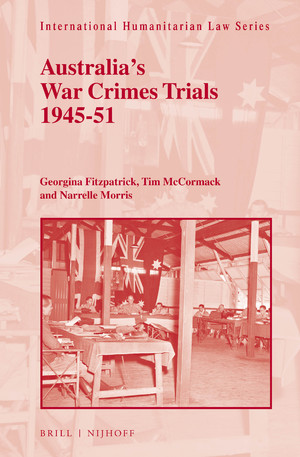This expensive and voluminous book is a fitting addition to our collection of texts relating to Military Law, an important segment of any comprehensive military library.
Many allied nations conducted war crimes trials after the Second World War. Australia conducted 300 such trials in Morotai, Wewak, Labuan, Darwin, Rabaul, Singapore, Hong Kong, and Manus Island. To enable the trials the Commonwealth government passed the War Crimes Act 1945 and approved regulations under that act. Military courts using the procedures of courts-martial would conduct the trials. Members of the court were usually serving combatant officers, assisted by judge-advocates from the Australian Army Legal Corps (AALC). This methodology is carefully examined in the book. The importance of the AALC in wartime becomes particularly evident.

Hardback 865pp RRP: $515.00
This volume is the first to examine this important topic. The several well-qualified authors have approached the subject methodically. A set of maps is well matched to the needs of the text, particularly as many place names have altered from the Dutch colonial to the present Indonesian era. A section of the book examines context, issues, and perspectives. A chapter summarises Japanese and Australian operations, sadly misplacing Gull Force on Timor, and Sparrow Force on Ambon, though the error is not propagated later. The chapter on jurisdiction of the Australian courts examines a range of issues including the span of the War Crimes Act, differences between Australian and British war crimes courts and the question of whether Australia could pass laws that have effect in other nations. A further chapter examines command responsibility – is the defence that ‘I did not know what was going on in my command’ valid? The other side of this issue, whether ‘I was just obeying orders’ is similarly scrutinised. The issue of whether a war crime can be committed against a civilian also looked at. These detailed analyses are clearly as important to current and future conflicts as they were in the Second World War. It is perhaps interesting to find parallels in East Timor in 1999.
Several later chapters examine crimes against downed airmen including reasons why trials were abandoned, and the trials associated with cannibalism. There is a comprehensive discussion of death sentences, whether carried out or commuted. The thought of Australian Army hangmen or firing squads is probably far from most people’s consideration.
The foregoing chapters make up the first 370 pages of this book. Subsequent chapters discuss the circumstances of the trials in each location, repatriation of the Japanese and the overall question of the fairness of the trials.
A former Chief Justice of the High Court, Sir Gerard Brennan, launched the book in Canberra at the War Memorial. Brennan had been an associate of Brigadier Keith Townley (also judge of the Supreme Court of Queensland). Townley had been an advocate at War Crimes trial in Morotai and later presided over trials at Manus Island. It seems presumptuous for a non-expert to review a book spoken about by the eminent justice and particularly so to analyse the legal aspects the book covers. Nevertheless, the discussion throughout the volume on whether these trials represented justice or revenge is carefully examined. It is a fascinating discussion.
The scale of atrocities committed by the Japanese, and particularly those inflicted on its prisoners, was enormous. Each single act was a criminal tragedy. Sandakan, Ambon, and the Thai-Burma death railway represent perhaps the apex of this cruelty. This important book examines the aftermath of the crimes: justice. It was applied with care, in accordance with priorities dictated in part by politics. Its results were uneven but not unjust.
Reviewed for RUSIV by Mike O’Brien, March 2018
Contact Royal United Services Institute about this article.






